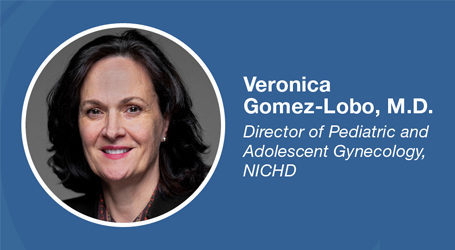 How did you become interested in science and research?
How did you become interested in science and research?
I wanted to be a doctor since I was 12 years old. Initially, my interest in medicine was to care for underserved populations, but when I was a resident, I found that I really enjoyed teaching medical students. Later, I worked as a residency director and became interested in scholarship and research. When I was invited to go to Children’s National to practice pediatric and adolescent gynecology (PAG), I found a very interesting clinical area in which there was a dearth of research. Since arriving at NICHD, I have found that my clinical research on fertility preservation in special populations who are at risk for premature ovarian insufficiency (POI) naturally leads to research on ovarian function and structure, and thus I developed my laboratory and scientific inquiry in this area.
What brought you to NICHD?
I was recruited by Dr. Constantine Stratakis to start a program in PAG at NIH. The PAG field fully supports the NICHD mission to lead “research and training to understand human development, improve reproductive health, enhance the lives of children and adolescents, and optimize abilities for all.” In July 2019, we moved the PAG fellowship from MedStar Hospital to NICHD, and then we recruited another pediatric gynecologist and a reproductive endocrinologist and infertility specialist.
Our program leverages the clinical, educational, and research opportunities in the Washington, D.C., metropolitan area with clinical training at Children’s National, MedStar, and the Clinical Center at NIH. We have established a laboratory and are planning ovarian tissue research in children who are at risk for POI. These opportunities to create a world-class program in PAG that involves rare conditions would not be possible outside of NIH.
What types of training, experiences, or traits are essential for success in your position?
Clinical and research training is important, but one of the most important traits is to maintain curiosity about the patients and biology. This curiosity allows one to continue to raise questions and reach out to experts to discuss them. Finally, you have to make sure you complete your projects.
What do you find most valuable about working at NICHD?
The most valuable aspects range from the incredible resources from other investigators to the availability of core facilities. Before I came to NIH, I was pressured to see a lot of patients, perform a lot of surgeries, and bring in money. Here, the pressure is on achieving excellence in training and mentoring as well as in research.
What is your favorite research finding out of everything you have worked on?
I worked on two funded projects regarding the local immune system of the lower genital tract of adolescent females. We know that adolescents are disproportionally affected by sexually transmitted infections, including HIV. Furthermore, early age of first intercourse is a risk factor for cervical cancer, which is mediated by human papillomavirus infection. Thus, there is concern that an immature local immune milieu in adolescents may place them at higher risk of these infections.
Our first project compared the immune markers of the lower genital tract in never sexually active and sexually active adolescents who were undergoing intrauterine device insertion for contraception or menstrual suppression. We analyzed a variety of inflammation-associated biomarkers and anti-HIV mediators and found differences between the two groups of girls. Our findings suggest that the higher pro-inflammatory biomarker TNF-α, as well as a distinct inflammation-associated immune clustering in sexually inactive girls, can potentially increase their risk for infections, including HIV, upon sexual debut.
Our second project evaluated whether hormonal birth control affects immune markers and the microbiome in sexually active adolescents who are on different methods of contraception. This study was conceived based on the observation that the progesterone contraceptive Depo-Provera (DMPA) is associated with a higher risk for HIV infection. Our research, which is the first study of its kind among U.S. adolescents, suggests that hormonal contraception does not significantly impact inflammation or the microbiome of the lower genital tract of adolescents. We’re currently preparing a manuscript on these findings.
If you have advanced along your career within the institute, can you summarize your career steps and how you successfully navigated the changes?
I am pretty new to NICHD and still figuring it all out.
What advice can you offer to people who are at an earlier stage of their career?
Look for and find mentors with whom you can discuss ideas, your career, and life trajectory. Do not be scared to seek opportunities, even if they feel out of reach for your stage in training. These include leadership in national groups, grants, and positions. You learn from all these experiences, and you will not progress in your career if you do not take chances.
Return to Get to Know NICHD.
 BACK TO TOP
BACK TO TOP